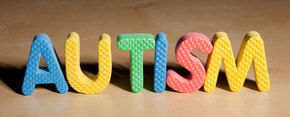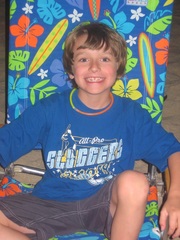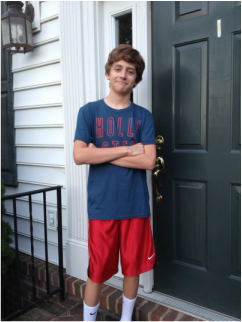
So yeah, even though for months I was able to summon the words, "My son has autism" to the very tip of my tongue, it took a while for my heart to catch up. Once I was finally able to remove Denial's hand from my mouth and no longer tremble when saying The A Word, it didn't take me long to discover that people had almost as difficult of a time hearing me say, "My son has autism" as I had saying it.
When you say, "My son/daughter has autism" people don't know how to respond. Most folks know not to say, "Woohoo!" and high five me, so many people almost become autistic themselves. They fumble for their speech, they turn their gaze away, they make horrible social blunders, and then quickly try to escape an uncomfortable situation.
We get it. We know you are at a loss for words. We know you don't know what the right response is. We know you feel awkward, unsure and really, really wish you had never stared rudely and commented on our child's behavior, but, once the cat is out of the bag, you can't pretend you didn't let it out. And neither can we.
So during this month of Autism Awareness, I thought I could help those dumbfounded, awkward, at a loss for words people out as much as I could. Seeing as how every situation is different and every child with autism is different, I may not be able to tell you exactly what to say, but, I can give you some helpful hints on what NOT to say.

2. "Are you sure he's autistic?" Yes, yes, I'm sure. I realize if he isn't spinning, flapping, asking to watch Judge Wapner or yelling, "Bazinga", he may not seem autistic to you, but, the 200 specialists we have seen, trying to reassure ourselves of that very question, confirmed that he is indeed, autistic.
3. "What do you think caused it?" We don't know. We wonder, we question and we agonize over everything we did, everything we ate, and every place we went while pregnant. We spend countless hours blaming ourselves, the environment, genetics, etc, then we finally realize, what caused our child's autism isn't nearly as important as what we are doing to support him. We want you to realize that too.
4. "Ohhhhh....what can he DO?" I said, he was autistic, not a circus monkey. We realize that there are misconceptions that all autistic people have some sort of exceptional ability, and although some do, most do not. So when you ask a mother this, not only does it reinforce that her child is "different" in the neurotypical world, it makes her feel like her child is "different" in the autistic world too, so just don't.

6. "I try to talk to him, but, he always ignores me. Maybe you should get his hearing checked." We have. He is not deaf. He hears you. He sees you. He knows you are there. Just like he knows when you don't see him, when you don't hear him and when you give up on him. Just because he does not speak to you, does not mean he isn't trying to communicate with you. If you say this, hopefully, the mother will say that.

8. "He's not thaaat bad." I didn't say he was bad. I didn't say he was broken. I didn't say how he sees the world is wrong. I said he has autism. "Different" is not "bad".
9. "He'll eat when he's hungry." No. He. Won't. (Duck again). And let me ask you, would you test your child with this theory? Would you wait him or her out for days and days to see how hungry he gets before he will eat what is put in front of him and not the food his sensory system tells him he needs? Stupid. Hateful. Stupid.

11. "I'm sorry". Don't be, I'm not (most days).
12. "Will he always be like THAT?" Will he always have autism? Yes. Will autism always impact his life in some way? Yes. Will he always see the world a little bit differently? Yes. Will he continue to grow, live, love, and find joy while teaching me to see his world? Yes. And that's why we don't want you to be sorry.


 RSS Feed
RSS Feed
